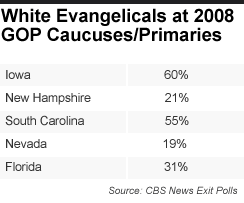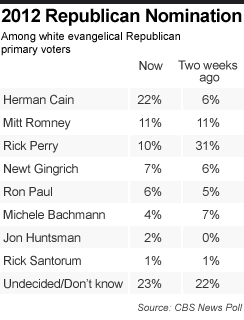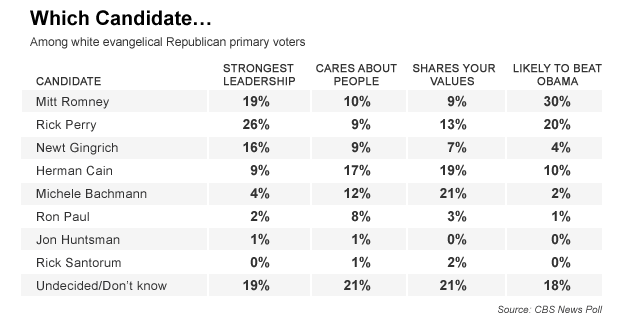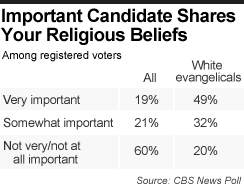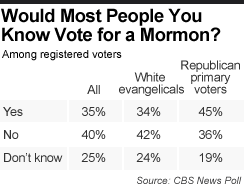Who has an edge with evangelicals in the GOP race?
Voters who describe themselves as evangelical or born again are an important voting bloc in Republican presidential politics. In the 2008 Republican nomination contests, 44 percent of voters identified themselves as evangelical or born-again.
That percentage was even higher in two important early states -- Iowa and South Carolina. In 2008, 60 percent of Iowa Republican caucus goers were evangelicals, and in South Carolina that number was 55 percent.
Evangelicals helped propel Mike Huckabee to victory in Iowa despite being outspent by rival Mitt Romney. Forty-six percent of evangelicals voted for Huckabee, while just 19 percent backed Romney. Even though John McCain was able to pull out a victory in South Carolina, Huckabee won the support of 43 percent of evangelicals, compared to 27 percent for McCain. Romney received the backing of only 11 percent of this group.
Mitt Romney performed better in early states where evangelical voters made up a smaller share of the electorate. He placed second to John McCain (by 6 points) in New Hampshire, where 21 percent of Republican primary voters identified themselves as evangelicals, and he handily won the Nevada caucuses. Nineteen percent of Nevada caucus goers were evangelicals, but more, 26 percent, shared Romney's religion - Mormonism.
The 2012 Election
A CBS News Poll released October 4 finds Herman Cain receives the support of 22 percent of white evangelical voters, up from 6 percent a couple of weeks ago. Eleven percent of evangelicals support Romney, and 10 percent back Perry. Bachmann gets just 4 percent.
Herman Cain rises, Rick Perry slides in new CBS News poll
But the race is still very fluid among these voters: 23 percent are undecided, and 82 percent say they could still change their minds about whom to support.
Evangelical voters don't see Mitt Romney as the candidate who most shares their values (21 percent say that is Bachmann, 19 percent pick Cain), the strongest leader (26 percent choose Rick Perry), or the most sympathetic to their needs (Cain tops that list, with 17 percent). Romney is seen as the most electable of the candidates by these voters -- 30 percent name him as the candidate most likely to beat Obama next November.
In a CBS/NY Times Poll conducted in mid-September, white evangelical voters overall were more likely to have a favorable (31 percent) than unfavorable (19%) opinion of Mitt Romney - although 50 percent were undecided or hadn't formed an opinion yet.
CBSNews.com special report: Election 2012
Religion and the Evangelical Vote
Religion factors into evangelicals' voting choices more heavily than it does for voters overall. Forty-nine percent of evangelical voters say it is very important to them that a presidential candidate shares their religious beliefs, and another 32 percent say that is somewhat important. That's much higher than the 19 percent of voters overall that feels that way.
There are two Mormon candidates running for the Republican presidential nomination this year - Jon Huntsman and Mitt Romney. While a third of white evangelicals say that most people they know would vote for a Mormon candidate for president, even more, 42 percent, say most people they know would not do so. Among voters who say they will vote in a Republican primary next year, 45 percent say most people they know would vote for a Mormon.
According to a February 2007 CBS News Poll, evangelicals tend to have a negative opinion of the Mormon religion. Just 24 percent said their view of Mormonism was very or somewhat favorable, while 45 percent said it was very or somewhat unfavorable (32 percent had no opinion).
